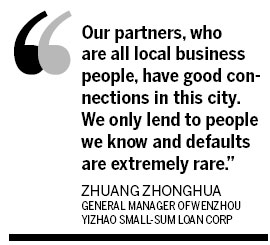Filling the gap in Wenzhou's finance market
By Yu Ran (China Daily) Updated: 2013-01-24 09:56Cen Li, general manager of the government-sponsored Wenzhou Financial Investment Group, said that he was feeling great pressure to show results.
After more than four months of tough negotiations, Cen managed to persuade the Zhejiang branch of China Development Bank and Wenzhou branch of Shanghai Pudong Development Bank to agree to provide up to 3 billion yuan in standby loans to qualified SMEs.
The first batch of loans, totaling 9.3 million yuan, has been offered to two local companies.
"The arrangement was something new to all of us," said Cen. "It took a long time for us to iron out all the issues. But I am glad to say that we are now ready to sign the formal agreement."
|
 |
Bringing the established banks into play is seen as key to the success of the financial reform. Their participation can help ensure a proper and regulated source of funding to the many SMEs in Wenzhou, and that's what financial reform is all about, said Ma Jinlong, an economist and former director of the Wenzhou government's economic research center.
For years, Wenzhou's merchants and manufacturers, shunned by the established banks, had to rely on underground lenders for funding. The key players in that market, with an estimated worth of around 300 billion yuan, are the middlemen. Some of them are registered moneylenders supervised by the local industrial and commercial bureau. Many more are individuals with well-established connections within the business community.
This market, mainly based on trust and guanxi, or personal connections, worked well when almost every merchant or factory owner was raking in money from the flood of overseas orders. The tide turned in 2008 when the export trade was hit hard by the global recession.
With overseas orders shrinking, many of Wenzhou's entrepreneurs began siphoning off their funds to more profitable endeavors: speculating in properties in Shanghai, coal mines in Shanxi or farm produce around the country.
The government's tough measures to cool the overheated property market since 2010 have effectively pulled the rug from under the feet of this band of Wenzhou marauders, as they have come to be known.
In the past couple of years, there have been frequent reports of Wenzhou factory owners fleeing abroad, leaving behind piles of debt and scores of unpaid workers.
The wave of defaults practically wiped out the underground lending market and triggered the outbreak of a local financial crisis that prompted the government to act.
Despite official enthusiasm, the Wenzhou business community has remained skeptical about the financial reforms.
Efforts to convince registered moneylenders to convert into finance companies under the supervision of the China Banking Regulatory Commission have met with stubborn resistance.
"We have no plan to change because our partners don't see any benefit in becoming a finance company," said Zhuang Zhonghua, general manager of Wenzhou Yizhao Small-Sum Loan Corp.
Zhuang told China Daily that his company has been doing well through good times and bad because he and his employees know their clients well.
"Our partners, who are all local business people, have good connections in this city," Zhuang said. "We only lend to people we know and defaults are extremely rare."
Skepticism lingers
Wenzhou Yizhao can obtain funding from large banks for loans to its clients, and make a profit from the interest spread. Zhuang declined to disclose the exact figures, but said that his company is doing well enough.
Financial reform on bumpy road
Private lenders offer little help for sagging SMEs
China has 6,000 microcredit companies
Private-loan court cases in Wenzhou on pace with 2011
Emergency funds to aid capital-deprived SMEs
Premier calls for greater efforts on financial reforms
Financial reforms 'should benefit real economy'
Pilot zones
Quanzhou becomes pilot financial reform zone
Wenzhou expects substantial financial reforms
Wenzhou needs a change of tack
Wenzhou unveils financial reform details
Find more in
- Belt and Road Initiative to change landscape of economic cooperation in South Asia
- Standard Chartered to be first to issue Special Drawing Rights bonds in China
- Crucial that G20 turns pledges into actions: Ex-IMF president
- Plan will reduce internet finance risks
- Lenovo to boost investment in startups targeting AR, VR
- Bidders showing interest in Attero stake
- Baotou seeks to be country's graphene capital
- Sinopec unit issues profit warning


















